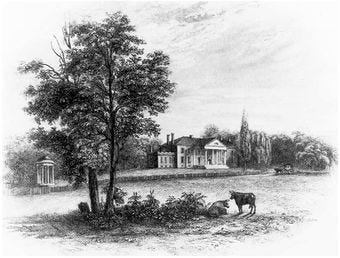“He Was Learning That There Was a Difference Between White Men and White Men Not to be Measured by Lifting Anvils or Gouging Eyes or How Much Whiskey You Could Drink…”
(Absalom, Absalom! Post #7, Chapter 7, pp.176-234)
This chapter opens with the manhunt for Sutpen’s runaway architect and the disclosures that Sutpen makes to Grandfather Compson while they await the dogs and Sutpen’s “wild niggers” to flush-out their quarry. Neither the architect’s reasons for trying to escape Sutpen’s Hundred at that time, nor the Jefferson community’s willingness to aid Sutpen in capturing and restraining the architect are readily apparent in the text. Perhaps the architect is indentured to Sutpen in some way of which the community is aware and condones? In any event, Sutpen and Compson are alone together for hours at a time, and Sutpen discloses details about his early life to Compson.
According to Sutpen, an event occurred when he was fourteen years old that led him to discover “what he just had to do…because if he did not do it he knew that he could never live with himself.” Sutpen grew up dirt poor in the mountains of the territory that would later become West Virginia, not knowing “there was a country all divided and fixed and neat…because of what color their skins happened to be and what they happened to own.” He had hardly heard of such a world until the whole family “fell into it,” when they set out from the mountains and eventually settled in the Virginia Tidewater. It was then that he realized the difference “not only between white men and black ones, but he was learning that there was a difference between white men and white men not to be measured by lifting anvils or gouging eyes or how much whiskey you could drink…”
“He still thought that that was just a matter of where you were spawned and how; lucky or not lucky; and that the lucky ones would be even slower and lother than the unlucky to take any advantage or credit for it…that they would feel if anything more tender toward the unlucky…He was to find all that out later. He remembered when he did it, because that was the same second when he discovered the innocence.”
What was this event that played such a pivotal role in Sutpen’s lifetime motivations and ambition? He was sent my his father on an errand to the man who “lived in the biggest house he had ever seen and spent most of the afternoon…in a barrel stave hammock between two trees, with his shoes off and a nigger who wore every day better clothes than he or his father and sisters had ever owned and ever expected to, who did nothing else but fan him and bring him drinks.”
He went to the front door of the rich man’s house in the “garments his father had got from the plantation commissary and had worn out and which one of his sisters had patched and cut down to fit him and he no more conscious of his appearance in them or of the possibility that anyone else would be than he was of his skin.”
“And now he stood there before that white door with the monkey nigger barring it and looking down at him in his patched made-over jeans clothes and no shoes…and the nigger told him, even before he had had time to say what he came for, never to come to that front door again but to go around to the back.”
“Of course he had not expected to be invited in to eat a meal…perhaps he had not expected to be asked into the house at all. But he did expect to be listened to because he had come, been sent, on some business…”
In relaying the event to Grandfather Compson, Sutpen insists that he was not mad, but “just thinking…because he knew that something would have to be done about it; he would have to do something about it in order to live with himself…”
Sutpen’s “innocence” is referenced again and again in this chapter. What was his innocence, exactly? It seems it was his ignorance of class injustice. That the “lucky” and fortunate white men in society would lord their wealth and prestige over powerless, poor whites. And this supremacy even extended to the wealthy white man’s house negro who had the authority, via his master, to humiliate and look down upon poor whites like him.
This kind of awakening to the injustices of class could not have been singular for boys like Sutpen, but it seems that there is something in his personal make-up, in the force of his personality that triggered the resolve to do something about his humiliation from this event. And what an awful legacy this common afront spawns in Sutpen!


When the “reveal” of why Supten was determined to build this house and have his slaves was disclosed, it did not endear him any more to me, but did bring some understanding to how he came to be who he is.
Also, in this chapter, I kept reminding myself that the poor architect is basically being “hunted” while Supten is having a casual confession of his life, stopping to take breaks with Compson. Strolling and talking with this frantic hunt for a human being happening in the background.
I am enjoying this gothic undercurrent that resides through the whole novel.